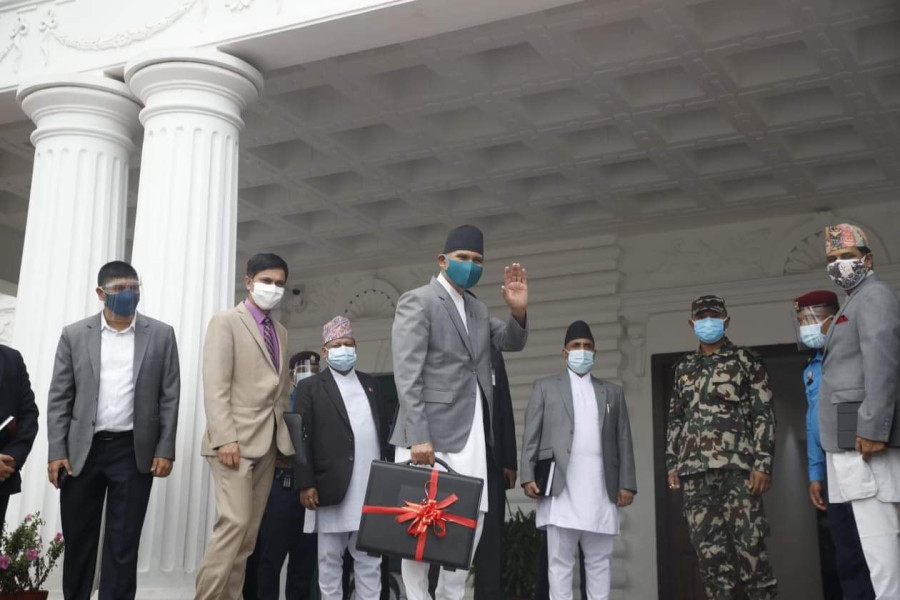Money
Incentives and tax rebates galore in new federal budget with focus on midterm elections
Incentives include deduction of value added tax on diesel and cooking gas for businesses and on payments through electronic mode.
Krishana Prasain
The government on Saturday announced massive incentives and tax rebates in the budget announced for the fiscal year 2021-22 beginning mid-July.
Some observers say the tax rebate and incentives is just a stunt aimed at elections the Oli government has declared for November 12 and November 19 after dissolving the House on May 21. The fate of the polls, however, hangs in the balance, as the dissolution move is currently at the Supreme Court.
But for businesses and traders, the budget has come as a respite.
The budget has abolished excise duty on import of electric vehicles and reduced customs duty significantly to increase the internal consumption of electricity and to promote the use of environmentally-friendly means of transportation.
Krishna Prasad Dulal, president of Nepal Automobile Dealers’ Association, said that the government's announcement to remove excise duty for electric vehicles will encourage sales in a massive way.
“The provision will have a price differential of Rs1 million to Rs3 million depending on electric motor capacity of the automobile and this will increase the use of electric vehicles,” Dulal said.
The government has been imposing 60 percent to 120 percent of excise duty on electric vehicles, he said.
The private sector has been setting up charging stations and the government said it will build 500 charging stations across the country.
Though the government in the budget has not mentioned exact customs waiver on electric vehicles but as it said that significant waiver has been provided so it might be good, he said.
“The budget has addressed many issues raised by the automobile sector of the country,” he said.
The government in the budget for the upcoming fiscal year has exempted 100 percent in income tax for startups for 5 years from the date of commencement of business. If private sector companies and firms provide a maximum of Rs100,000 seed capital to five start-ups, the amount can be deducted while calculating the taxable income.
Kavi Raj Joshi, founder and managing director of Next Venture Crop said that the execution part plays an important role as the government failed to implement its provisions in the previous fiscal year’s budget.
“But if the government implements the provision then it will have a huge impact on the start-up sector,” he said. “I take it as natural progress and also a positive step from the government for start-up entrepreneurs. But if the government fails to effectively implement it then entrepreneurs are not going to trust the government next time.”
The budget for the fiscal year 2020-21 has also provisioned to provide tax waiver and subsidies on the industry and business impacted by the Covid-19.
The budget has provisioned to give 90 percent income tax exemption to the taxpayers with an annual turnover of up to Rs2 million, 75 percent to the taxpayers with annual turnover of Rs2 million to Rs5 million and 50 percent having annual turnover of Rs5 million to Rs10 million.
Extending the period bringing forward losses to 10 years in the sectors like hotels, travel, trekking, transport and air services, film industry and media houses that have been badly impacted by the Covid-19, the government in the budget has provisioned only 1 percent income tax in the taxable income.
Companies and firms which have not submitted annual statements and renewed their licenses up to the fiscal year 2019-20, as per the Company Act-2006 and Private Firm Registration Act-1958, will be waived the remaining fees and penalties if they pay 10 percent of the details and fees and fines by mid-October 2021.
The budget has provisioned to deduct value added tax paid on the purchase of diesel and cooking gas used in the taxable business of the taxpayer. The government on the budget for upcoming year has exempted value added tax on transportation service, freight, cargo service, e-library service, security deposit fee, trekking and tour package and in the issuance of certificate of origin.
The government on the budget of upcoming fiscal year has exempted customs duty, value added tax and excise duty on import, production and sale and distribution of oxygen gas, liquid oxygen, oxygen cylinder, oxygen concentrator and other life-giving materials and medicines till mid-January 2022.
The government has reduced the customs duty of induction cookers to 1 percent and decreased the customs duty by abolishing the excise duty on refrigerators, grinders, rice cookers, fans and other electrical home appliances.
To promote infant health and nutrition, the upcoming fiscal year budget has reduced the customs duty on infant milk by 50 percent.
The government has kept the rate of value added tax unchanged and has made general adjustments in the rates of customs duty. It has increased excise duty on alcohol, beer, wine, cigarettes, tobacco and soft drinks.
There is also a provision for immediate refund of 10 percent of the value added tax on payments made on purchasing goods and services through debit card, credit card, quick response (QR) code, scan and pay and payment made using other electronic means.
For the protection of domestic industry, the tariff rate of industrial raw material has been provisioned to be at least one tier lower than that of finished goods. Excise duty on some items for domestic production has been removed.
The government has waived customs duty on the import of machinery, equipment and parts used in tea, jute, film, pashmina, hatchery industry and agriculture and nursery farms. Customs duty on the import of containers by shipping companies registered in Nepal has been reduced.
In order to increase production and employment by commercializing agriculture, the budget gives a 50 percent exemption on tax on commercial agricultural income. Also provisioned is a 50 percent waiver on the customs duty on a means of transportation imported by a collective commercial agricultural cooperative.
In order to accelerate the economic recovery after the Covid-19 pandemic, the policy of reducing the corporate income tax rate by 1 percent every year will be adopted to maintain the institutional income tax rate at 15 percent within 5 years for productive industries starting from the fiscal year 2021-22.
The budget has provisions for domestic and foreign investment promotion through its revenue policy and preservation and trade facilitation of domestic industry.




 27.41°C Kathmandu
27.41°C Kathmandu















